In a year of widespread and often devastating hardships, no business or industry came through 2020 untouched by the Covid-19 pandemic. But for some key sectors, the news wasn’t all bad.Here’s a look at the biggest winners and losers in 2020 and a preview of what the year ahead might bring.
Winner: Housing
 A “sold” sign outside a home under construction in Ballston Lake, New YorkThe housing market was red hot in 2020, defying the Covid-19-induced weakness in the broader economy. In fact, the pandemic is probably one of the main drivers of the housing market’s strength. Prices and sales surged as city dwellers looked to move to the suburbs to find larger spaces for at-home work and schooling.Shares of builders, including Lennar (LEN) and D.R. Horton (DHI), as well as retailers catering to homeowners, such as Home Depot (HD), Lowe’s (LOW) and Williams-Sonoma (WSM), soared in 2020. Home Depot sales increased 18%, while Lowe’s sales increased 23%.
A “sold” sign outside a home under construction in Ballston Lake, New YorkThe housing market was red hot in 2020, defying the Covid-19-induced weakness in the broader economy. In fact, the pandemic is probably one of the main drivers of the housing market’s strength. Prices and sales surged as city dwellers looked to move to the suburbs to find larger spaces for at-home work and schooling.Shares of builders, including Lennar (LEN) and D.R. Horton (DHI), as well as retailers catering to homeowners, such as Home Depot (HD), Lowe’s (LOW) and Williams-Sonoma (WSM), soared in 2020. Home Depot sales increased 18%, while Lowe’s sales increased 23%.
Loser: Travel and Hospitality
 The cruise ship “Carnival Pride” part of the Carnival Cruise Line is seen moored at a quay in the port of Miami.Going on vacation wasn’t an option for most during the pandemic. The cruise industry was battered as Carnival (CCL), Royal Caribbean (RCL) and Norwegian (NCLH) were forced to suspend voyages for much of 2020 and into 2021. All three stocks plummeted between 45% and 60% this year.The news wasn’t much better for hotel chains, which were hammered by a decline in demand for both leisure and business travel.
The cruise ship “Carnival Pride” part of the Carnival Cruise Line is seen moored at a quay in the port of Miami.Going on vacation wasn’t an option for most during the pandemic. The cruise industry was battered as Carnival (CCL), Royal Caribbean (RCL) and Norwegian (NCLH) were forced to suspend voyages for much of 2020 and into 2021. All three stocks plummeted between 45% and 60% this year.The news wasn’t much better for hotel chains, which were hammered by a decline in demand for both leisure and business travel.
Winner: Cannabis
 Cannabis plants in a greenhouseMarijuana is still not legal on the Federal level, but four more states approved cannabis use for recreational purposes on Election Day, making the drug legal in 13 states. The industry remains hopeful for a federal decriminalization of cannabis during the Biden administration. Products containing CBD — which is extracted from hemp and cannabis — are already legal and sales also surged in 2020.All this helped drive a pot stock bonanza. Shares of Canopy Growth (CGC) and Cronos (CRON), backed by Constellation Brands and Altria, respectively, have soared since November. The stock of current industry leader Curaleaf (CURLF) skyrocketed too, nearly doubling on the year.
Cannabis plants in a greenhouseMarijuana is still not legal on the Federal level, but four more states approved cannabis use for recreational purposes on Election Day, making the drug legal in 13 states. The industry remains hopeful for a federal decriminalization of cannabis during the Biden administration. Products containing CBD — which is extracted from hemp and cannabis — are already legal and sales also surged in 2020.All this helped drive a pot stock bonanza. Shares of Canopy Growth (CGC) and Cronos (CRON), backed by Constellation Brands and Altria, respectively, have soared since November. The stock of current industry leader Curaleaf (CURLF) skyrocketed too, nearly doubling on the year.
Loser: Oil
 The oil industry had a miserable 2020.Plenty of industries grappled with plunging prices in 2020, but oil is the only major commodity that went negative. The unprecedented trip below zero this spring was caused by an epic collapse in demand during the pandemic and a price war between Saudi Arabia and Russia.Although crude rebounded, oil-and-gas companies are still in crisis. Dozens of frackers have gone bankrupt. The S&P 500’s energy sector is down by more than 30% this year, making it easily the worst performer in the stock market. ExxonMobil (XOM) would easily be the biggest loser in the Dow Jones Industrial Average — but the once-mighty company was ousted from the index this summer.
The oil industry had a miserable 2020.Plenty of industries grappled with plunging prices in 2020, but oil is the only major commodity that went negative. The unprecedented trip below zero this spring was caused by an epic collapse in demand during the pandemic and a price war between Saudi Arabia and Russia.Although crude rebounded, oil-and-gas companies are still in crisis. Dozens of frackers have gone bankrupt. The S&P 500’s energy sector is down by more than 30% this year, making it easily the worst performer in the stock market. ExxonMobil (XOM) would easily be the biggest loser in the Dow Jones Industrial Average — but the once-mighty company was ousted from the index this summer.
Winner: Solar
 Calexico Solar Farm II in Calexico, CaliforniaThe rise of socially conscious investing helped carry the solar industry to a blockbuster year. Investors increasingly view fossil fuel companies as the prime contributor to the climate crisis — and they’re betting solar firms are a crucial part of the solution.The Invesco Solar ETF (TAN) has spiked more than 200% this year. Sunrun (RUN), America’s largest rooftop solar company, is up more than 300%. These are staggering gains driven by strong demand for solar energy, the ascendance of the Environmental, Social and Corporate Governance (ESG) investing movement and enthusiasm over the coming reversal in Washington’s climate policy.\
Calexico Solar Farm II in Calexico, CaliforniaThe rise of socially conscious investing helped carry the solar industry to a blockbuster year. Investors increasingly view fossil fuel companies as the prime contributor to the climate crisis — and they’re betting solar firms are a crucial part of the solution.The Invesco Solar ETF (TAN) has spiked more than 200% this year. Sunrun (RUN), America’s largest rooftop solar company, is up more than 300%. These are staggering gains driven by strong demand for solar energy, the ascendance of the Environmental, Social and Corporate Governance (ESG) investing movement and enthusiasm over the coming reversal in Washington’s climate policy.\
Loser: Banks
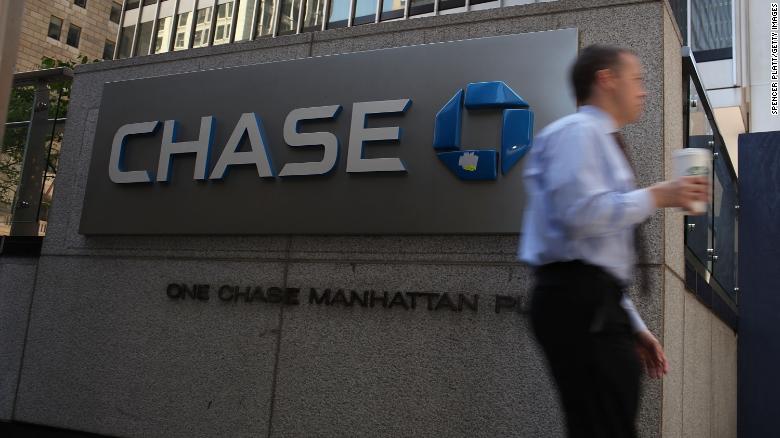 Banks were among 2020’s biggest losers.This was easily the worst year for America’s banks since the Great Recession. Lenders suffered tens of billions of dollars in losses as they braced for loan defaults and share prices spiraled lower. Even big banks such Citigroup (C) and Bank of America (BAC) are finishing the year sharply lower, and Wells Fargo (CBEAX) remains a hot mess
Banks were among 2020’s biggest losers.This was easily the worst year for America’s banks since the Great Recession. Lenders suffered tens of billions of dollars in losses as they braced for loan defaults and share prices spiraled lower. Even big banks such Citigroup (C) and Bank of America (BAC) are finishing the year sharply lower, and Wells Fargo (CBEAX) remains a hot mess
Winner: Bitcoin

Bitcoin and other cryptocurrencies plunged alongside the stock market shortly after Covid-19 ground the US economy to a standstill in March. But bitcoin (ARSC) has come roaring back to hit new all-time highs near $30,000 since then. Prices have more than tripled this year.Investors have flocked to bitcoin as the US dollar has weakened — largely a result of the Fed slashing interest rates to zero. And top hedge fund managers Paul Tudor Jones and Stanley Druckenmiller helped validate bitcoin with investments this year. Many investors view bitcoin as a replacement for gold — a hedge against further declines in the dollar.
Loser: Airlines
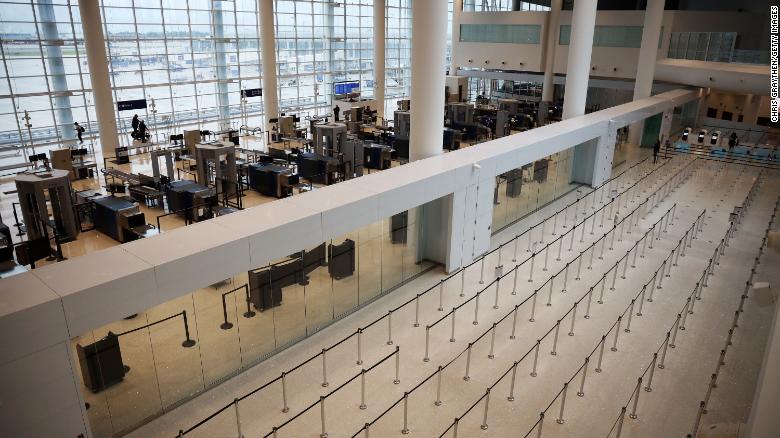 Empty TSA security lines are seen at Louis Armstrong International Airport in New Orleans, Louisiana. Air travel is down an estimated 94 percent due to the coronavirus pandemicThe airline industry had awful years in the past, but none were as devastatingly horrendous as 2020.US air travel came to a virtual halt in April. Traffic rebounded modestly late in the year, despite climbing Covid-19 cases, but the number of passengers screened by TSA at US airports was still down 63% compared to a year ago during the holiday travel season.Airlines got $50 billion in grants and loans from the federal government earlier this year to weather the storm and are poised to get an additional $15 billion from the recently passed stimulus package. But they still lost $24.2 billion in the first nine months of this year.
Empty TSA security lines are seen at Louis Armstrong International Airport in New Orleans, Louisiana. Air travel is down an estimated 94 percent due to the coronavirus pandemicThe airline industry had awful years in the past, but none were as devastatingly horrendous as 2020.US air travel came to a virtual halt in April. Traffic rebounded modestly late in the year, despite climbing Covid-19 cases, but the number of passengers screened by TSA at US airports was still down 63% compared to a year ago during the holiday travel season.Airlines got $50 billion in grants and loans from the federal government earlier this year to weather the storm and are poised to get an additional $15 billion from the recently passed stimulus package. But they still lost $24.2 billion in the first nine months of this year.
Winner: Video games
 The leisurely world of Nintendo’s latest release “Animal Crossing: New Horizons” has struck a chord with gamers around the world .Consumers were stuck at home this year, and video games gave players an opportunity to pass the time alone while still interacting with their friends. That helped the video games industry boom this year, from sold out Nintendo Switch consoles, to record growth on streaming platforms, including Facebook Gaming and Amazon’s Twitch. Esports benefited, too, when traditional sports were paused.In March, as countries around the world were heading into lockdown, “Animal Crossing: New Horizons” was released and became a record hit for Nintendo, selling 26 million copies at $60 apiece. Google’s video platform YouTube logged its best year ever in 2020 with more than 100 billion hours in gaming content viewed.
The leisurely world of Nintendo’s latest release “Animal Crossing: New Horizons” has struck a chord with gamers around the world .Consumers were stuck at home this year, and video games gave players an opportunity to pass the time alone while still interacting with their friends. That helped the video games industry boom this year, from sold out Nintendo Switch consoles, to record growth on streaming platforms, including Facebook Gaming and Amazon’s Twitch. Esports benefited, too, when traditional sports were paused.In March, as countries around the world were heading into lockdown, “Animal Crossing: New Horizons” was released and became a record hit for Nintendo, selling 26 million copies at $60 apiece. Google’s video platform YouTube logged its best year ever in 2020 with more than 100 billion hours in gaming content viewed.
Loser: Malls
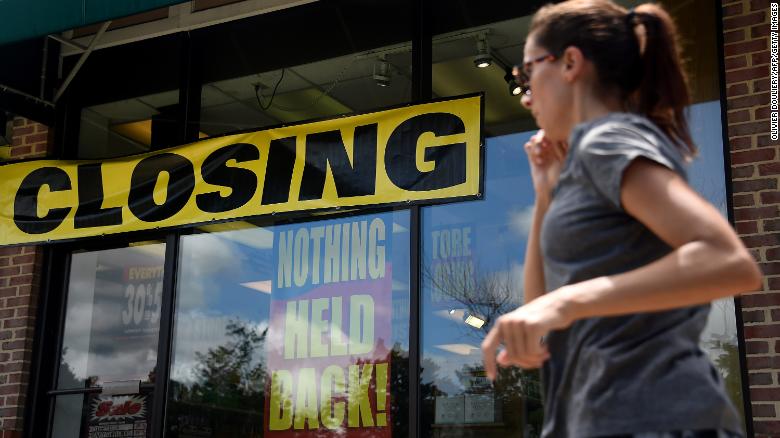
Several national mall-staple department stores, which were already struggling before the pandemic, toppled into bankruptcy, including JCPenney, Neiman Marcus and Lord & Taylor. Although the first two are still in business, Lord & Taylor announced it would shut all its stores.Clothing retailers were particularly hard hit, as millions of people lost jobs and millions more shifted to working from home, reducing the need to buy office clothes. Tailored Brands, which operates Men’s Warehouse and Jos. A. Bank, and Ascena, owner of Ann Taylor and Lane Bryant, both fell into bankruptcy.The pandemic devastated mall owners. Most malls were forced to close during lockdown orders of the spring, and the wave of bankruptcies by tenants left them with billions in unpaid rent.
Winner: Big Retail
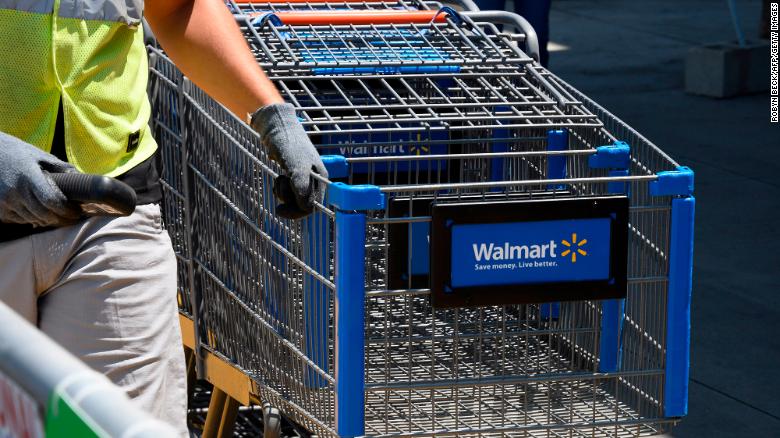 Walmart was one of 2020’s stars.Amazon (AMZN) and other online retailers were among the biggest winners of the pandemic, as people grew cautious about leaving their homes. But big-box stores, such as Walmart (WMT), Target (TGT) and Costco (COST), also won big, as shoppers flocked to stores where they could get all their shopping done in one go. Sales increased 7% at Walmart, 12% at Costco and 19% at Target in their most recent past three quarters.Those stores were deemed essential and were allowed to remain open during the spring when many other stores were forced to close. Target and Walmart also increased their online sales thanks to curbside pickup.
Walmart was one of 2020’s stars.Amazon (AMZN) and other online retailers were among the biggest winners of the pandemic, as people grew cautious about leaving their homes. But big-box stores, such as Walmart (WMT), Target (TGT) and Costco (COST), also won big, as shoppers flocked to stores where they could get all their shopping done in one go. Sales increased 7% at Walmart, 12% at Costco and 19% at Target in their most recent past three quarters.Those stores were deemed essential and were allowed to remain open during the spring when many other stores were forced to close. Target and Walmart also increased their online sales thanks to curbside pickup.
Loser: Automakers
 Automakers are poised for a rebound in 2021.The auto industry suffered a body blow from the pandemic in its early months, as factories shut down and demand for cars fell sharply.Job losses soared and car companies reduced shifts for millions of autoworkers. Rental car companies, typically a major buyer of new cars, virtually stopped their purchases as air travel ground to a halt and demand for rental cars plummeted. At 102-years-old, Hertz (HTZ) was forced to file for bankruptcy.
Automakers are poised for a rebound in 2021.The auto industry suffered a body blow from the pandemic in its early months, as factories shut down and demand for cars fell sharply.Job losses soared and car companies reduced shifts for millions of autoworkers. Rental car companies, typically a major buyer of new cars, virtually stopped their purchases as air travel ground to a halt and demand for rental cars plummeted. At 102-years-old, Hertz (HTZ) was forced to file for bankruptcy.
Winner: Big Tech
 Zoom’s stock exploded more than 400% higher in 2020.Technology emerged a winner during the pandemic as cloud and connectivity services thrived in a stay-at-home world.Netflix (NFLX) revenue jumped 73% in the most recent three quarters. Video conferencing service Zoom’s sales soared 307%. And Amazon was among the biggest winners, with sales leaping $67 billion, or 35%, in the first three quarters of the year.America’s economy grew more dependent on the technology sector than on traditional sectors such as manufacturing or retail. So investors rushed to buy up tech stocks, driving up their value. The nation’s five most valuable companies — Microsoft (MSFT), Apple (AAPL), Amazon (AMZN), Google owner Alphabet (GOOG) and Facebook (FB), are now worth more than $7.5 trillion combined.
Zoom’s stock exploded more than 400% higher in 2020.Technology emerged a winner during the pandemic as cloud and connectivity services thrived in a stay-at-home world.Netflix (NFLX) revenue jumped 73% in the most recent three quarters. Video conferencing service Zoom’s sales soared 307%. And Amazon was among the biggest winners, with sales leaping $67 billion, or 35%, in the first three quarters of the year.America’s economy grew more dependent on the technology sector than on traditional sectors such as manufacturing or retail. So investors rushed to buy up tech stocks, driving up their value. The nation’s five most valuable companies — Microsoft (MSFT), Apple (AAPL), Amazon (AMZN), Google owner Alphabet (GOOG) and Facebook (FB), are now worth more than $7.5 trillion combined.
Loser: Manufacturing
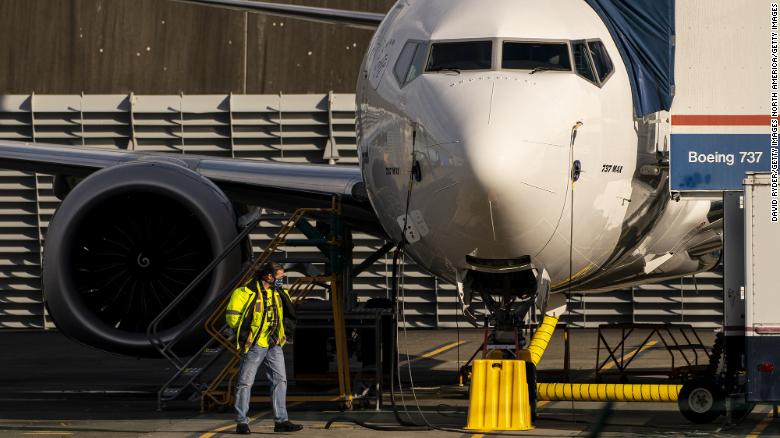 The 737 Max wasn’t the only problem Boeing faced in 2020.Traditional manufacturing had a very tough year. Industrial production plunged 16.5% between February and April. Even after rebounding, the nation’s factories are still producing at 5% below their pre-pandemic levels. America’s aluminum production is down 8.1% while steel production is down 18%.No manufacturer had more trouble than Boeing (BA) in 2020, which was hit by the downturn in air travel and airline customers trying to conserve cash and delay or cancel aircraft purchases. Boeing came into the year as the nation’s largest exporter, so the near-halt of commercial aircraft purchases was a major drag on the broader economy.
The 737 Max wasn’t the only problem Boeing faced in 2020.Traditional manufacturing had a very tough year. Industrial production plunged 16.5% between February and April. Even after rebounding, the nation’s factories are still producing at 5% below their pre-pandemic levels. America’s aluminum production is down 8.1% while steel production is down 18%.No manufacturer had more trouble than Boeing (BA) in 2020, which was hit by the downturn in air travel and airline customers trying to conserve cash and delay or cancel aircraft purchases. Boeing came into the year as the nation’s largest exporter, so the near-halt of commercial aircraft purchases was a major drag on the broader economy.
Winner: Creators
 Charli D’Amelio and other creators were beneficiaries of the stay-at-home culture of 2020.Creators have been finding ways to keep their content fresh and innovative throughout 2020, especially during the pandemic. The platforms that support these creators have benefited significantly.Twitch downloads jumped 61% worldwide from January to November, according to Apptopia, a mobile app and business intelligence company. Patreon, a social and membership platform for content creators, grew 43%, and downloads of Cameo, an app that allows you to pay for celebrity shout-outs, rose 134%. These platforms allowed creators to produce content easier, broadcast it further and also monetize it. That’s due in part to pandemic lockdowns that have helped redefine the creator landscape of who gets noticed and why — with social media serving as the megaphone for the content these creators share and post.
Charli D’Amelio and other creators were beneficiaries of the stay-at-home culture of 2020.Creators have been finding ways to keep their content fresh and innovative throughout 2020, especially during the pandemic. The platforms that support these creators have benefited significantly.Twitch downloads jumped 61% worldwide from January to November, according to Apptopia, a mobile app and business intelligence company. Patreon, a social and membership platform for content creators, grew 43%, and downloads of Cameo, an app that allows you to pay for celebrity shout-outs, rose 134%. These platforms allowed creators to produce content easier, broadcast it further and also monetize it. That’s due in part to pandemic lockdowns that have helped redefine the creator landscape of who gets noticed and why — with social media serving as the megaphone for the content these creators share and post.
Loser: Movie Theaters

The coronavirus pandemic forced theaters shut around the world, leading US box office sales to plummet nearly 80%, according to Comscore, It also pushed more people stuck at home to streaming. Netflix and Disney+ thrived while the $43 billion global theater global business was ravaged.
Winner: Streaming
 Olivia Colman as Queen Elizabeth II in season four of Netflix’s The Crown.For years, it seemed as if streaming and movie theaters were at war with one another. Streamers such as Netflix wanted to deliver entertainment to consumers whenever, wherever and theaters wanted to maintain the exclusivity that’s been vital to their business (and popcorn sales) for the last century. In 2020, it appears that streaming won.
Olivia Colman as Queen Elizabeth II in season four of Netflix’s The Crown.For years, it seemed as if streaming and movie theaters were at war with one another. Streamers such as Netflix wanted to deliver entertainment to consumers whenever, wherever and theaters wanted to maintain the exclusivity that’s been vital to their business (and popcorn sales) for the last century. In 2020, it appears that streaming won.
